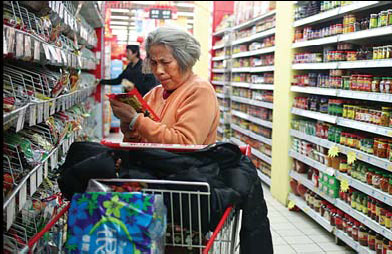Number of courses shrinks as people tighten their belts
Updated: 2012-01-13 07:45
By Shi Jing (China Daily)
|
||||||||
|
A customer at a Wumart supermarket in Beijing's Chaoyang district on Thursday. [Wang Jing / China Daily] |
SHANGHAI - Jiang Qigang likes his food. He says that just three months ago, he would frown and grumble about only having a three-course meal at dinnertime. However, he has been forced to relent and grudgingly make do with the once hard-to-accept arrangement because of soaring food prices.
"In the past I would certainly complain to my wife if she made only three courses for dinner. But as the price of food is surging, I have no choice but to put up with the current situation because our salaries are not keeping up with inflation," said the 29-year-old banking analyst from Shanghai.
It used to be a rule at Jiang's house that there should be at least two meat dishes, two fish dishes and soup every night. But now the menu has been reduced to one meat dish and one fish dish with a vegetable salad. The soup has become optional.
"The price of fish has been increasing like crazy. Pomfret (found in the Atlantic, Pacific and Indian oceans) for instance, sold for about 27 yuan ($4.27) each last year. But now the price has soared to about 40 yuan," said Jiang, who says he cannot go without fish for a single meal.
"However, I find the increase in the price of fruit the most striking. A box of strawberries that contains around 30 cost 18 yuan last year. But this year a box of 12 strawberries costs more than 10 yuan," he said.
To further cut expenditure, Jiang has not bought wine for dinner at home since October and has also cut back on meals at restaurants. "I ate at a Vietnamese restaurant with my wife the other day. The two bowls of pho and an appetizer cost us 200 yuan. We did not order any alcohol either. It's like the price of everything is rising," he said.
Lu Yongchun, a 55-year-old Shanghai housewife, is busy making special purchases for the Spring Festival.
"Small grocery shops or booths at food markets are all selling their products at higher prices. I have seen my household expenses rise by 15 to 20 percent over the past three months," said Lu, who keeps a daily record of her family's expenditure.
"Expenditure at home has also risen because we feel insecure about the food served outside after food safety scandals broke out one after another. Therefore, we would now rather buy something more expensive, but which is guaranteed to be of good quality," she said.
However, Zhou Yifei, a 25-year-old accounting analyst from Shanghai, said the rise in food prices has not had any real impact on her family.
"Food does not take up a huge part of my family's daily expenses. The impact may be more notable to those living on lower salaries, I guess," said Zhou, who has started buying imported cosmetics and clothing mostly from online agents.
"The price increase is only noticeable when I am traveling around. For example, when I visited Hong Kong 10 years ago, I found the food served in some restaurants was way more expensive than in Shanghai. But nowadays you may find that the food served in Hong Kong is cheaper, because it is routine to pay about 100 yuan per person if you eat at any restaurant in Shanghai," she said.
Food prices, which account for nearly one-third of the basket of goods used in the calculation of the consumer price index, rose 9.1 percent year-on-year in December, a month-on-month increase of 1.2 percent, the National Bureau of Statistics said on Thursday.
China Daily

 Relief reaches isolated village
Relief reaches isolated village
 Rainfall poses new threats to quake-hit region
Rainfall poses new threats to quake-hit region
 Funerals begin for Boston bombing victims
Funerals begin for Boston bombing victims
 Quake takeaway from China's Air Force
Quake takeaway from China's Air Force
 Obama celebrates young inventors at science fair
Obama celebrates young inventors at science fair
 Earth Day marked around the world
Earth Day marked around the world
 Volunteer team helping students find sense of normalcy
Volunteer team helping students find sense of normalcy
 Ethnic groups quick to join rescue efforts
Ethnic groups quick to join rescue efforts
Most Viewed
Editor's Picks

|

|

|

|

|

|
Today's Top News
Health new priority for quake zone
Xi meets US top military officer
Japan's boats driven out of Diaoyu
China mulls online shopping legislation
Bird flu death toll rises to 22
Putin appoints new ambassador to China
Japanese ships blocked from Diaoyu Islands
Inspired by Guan, more Chinese pick up golf
US Weekly

|

|







